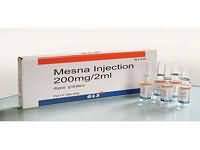Mesna

CLINICAL USE
Prophylaxis of urothelial toxicity in patients treated with ifosfamide or cyclophosphamide
DOSE IN NORMAL RENAL FUNCTION
Dose and timing depends on cytotoxic agent and on route of administration of mesna
PHARMACOKINETICS
Molecular weight :164.2 %Protein binding :70 %Excreted unchanged in urine : 32 Volume of distribution (L/kg) :0.65half-life – normal/ESRD (hrs) :0.3/– DOSE IN RENAL IMPAIRMENT
GFR (mL/MIN)
20 to 50 : See ‘Other Information’ 10 to 20 : See ‘Other Information’ <10 : See ‘Other Information’ DOSE IN PATIENTS UNDERGOING RENAL REPLACEMENT THERAPIES
CAPD :Unknown dialysability. Dose as in GFR <10 mL/min HD :Probably dialysed. Dose as in GFR <10 mL/minHDF/high flux :Probably dialysed. Dose as in GFR <10 mL/minCAV/VVHD :Unknown dialysability. Dose as in GFR 10 to 20 mL/min IMPORTANT DRUG INTERACTIONS
Potentially hazardous interactions with other drugsNone known ADMINISTRATION
Reconstition
– Route
Oral, IV bolus, IV infusion
Rate of Administration
IV bolus: over 15–30 minutes IV infusion
: over 12–24 hours Comments
Compatible with sodium chloride 0.9% and glucose 5%Mesna injection can be administered orally in orange juice or cola to improve palatability OTHER INFORMATION
Urinary output should be maintained at 100 mL/hr (as required for oxazaphosphorine treatment)The dose of mesna is dependent on the dose of oxazaphosphorine, e.g. reduce dose of cyclophosphamide to 50% of normal if GFR <10 : mL/min; hence, dose of mesna will consequently be reducedFrom what is known about the pharmacokinetics and mechanism of action of mesna, its availability in the urinary tract depends on renal functionIn the case of completely anuric patients (extremely rare) neither cyclophosphamide nor its metabolites should appear in the urinary tract: the use of mesna concomitantly may therefore be unnecessary in anuric patients. If there is any risk of cyclophosphamide or its metabolites entering the urinary tract, mesna should probably be given to prevent urothelial toxicityLimited kinetic information would suggest mesna would be eliminated by haemodialysis.
See how to identify renal failure stages according to GFR calculation
See how to diagnose irreversible renal disease
Home









